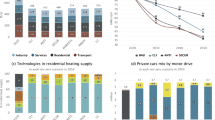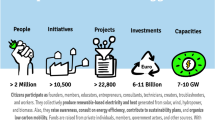Abstract
The achievement of sustainable energy systems requires well-designed energy policies, particularly targeted strategies to plan the direction of energy development, regulations monitored and executed through credible authorities and laws enforced by the judicial system for the enhancement of actions and national targets. The Asia–Pacific region (APAC), responsible for more than half of global energy consumption, has enacted a large number of energy policies over the past two decades, but progress on the energy transition remains slow. This study focuses on the aggregate effect of energy policies on the progress towards sustainable targets in 42 emerging economies from 2000 to 2017. We find that energy policies have contributed to improving access to electricity (3.0%), access to clean cooking (3.8%), energy efficiency (1.4%) and renewable electricity capacity (6.9%), respectively. Among different types of energy policy (strategies, laws and regulations), strategies have greater impacts on advancing electrification, clean cooking and renewable electricity capacity than laws and regulations, whereas the laws are more effective for achieving energy efficiency.
This is a preview of subscription content, access via your institution
Access options
Access Nature and 54 other Nature Portfolio journals
Get Nature+, our best-value online-access subscription
$29.99 / 30 days
cancel any time
Subscribe to this journal
Receive 12 digital issues and online access to articles
$119.00 per year
only $9.92 per issue
Buy this article
- Purchase on Springer Link
- Instant access to full article PDF
Prices may be subject to local taxes which are calculated during checkout




Similar content being viewed by others
Data availability
We employ three sets of data for the Asia–Pacific region over the period 2000–2017 in this study: socio-economic data, energy policy data and SDG7 indicators data. The socio-economic data are collected from the World Development Indicators database58 and World Economic Situation and Prospects 201832, including the level of income, country’s income and geographic classifications, urbanization rate, GDP per capita, export and import shares, service shares and energy import shares.
Energy policy data are collected from the Asia Pacific Energy Portal Policy database. The database consists of 2,112 energy policies from 42 emerging economies in APAC over the period 2000–2017. After collection, we collated and calculated the number of existing policies for different countries and sorted all policies into three policy types according to the type of document (Supplementary Table 7), which are laws (Law or Act in original policy document category), regulations (Rule or Regulation) and strategies (Strategy or Plan). If a policy includes more than one type of document, all such types will be considered in the respective stock calculations. In Fig. 4, the effect of ‘other’ is the total policy effect minus the sum of the effects of the three types of policy, which includes Standard, Agreement and Government Report documents that are not prominent in energy policy stocks.
Data about the SDG7 indicators in APAC are obtained from the Global SDG Indicators Database29. The renewable energy capacity data are collected from the International Renewable Energy Agency59. We control the differences in policy implementation using a number of indicators, including voice and accountability, political stability, government effectiveness, regulatory quality, control of corruption and rule of law56, which are exported from the Worldwide Governance Indicators60.
Code availability
Code is available on Github (https://github.com/Peipei-Chen/Energy-policy-in-APAC/).
References
Energy Transitions Indicators—Analysis (IEA, 2019).
Kittner, N., Lill, F. & Kammen, D. M. Energy storage deployment and innovation for the clean energy transition. Nat. Energy 2, 17125 (2017).
World Energy Scenarios Composing Energy Futures to 2050 (World Energy Council, 2013).
APEC Energy Demand and Supply Outlook 7th edn, Vol. I (APERC, 2019).
Koçak, E. & Şarkgüneşi, A. The renewable energy and economic growth nexus in Black Sea and Balkan countries. Energy Policy 100, 51–57 (2017).
Destek, M. A. & Aslan, A. Renewable and non-renewable energy consumption and economic growth in emerging economies: evidence from bootstrap panel causality. Renew. Energy 111, 757–763 (2017).
Energy Transition in Asia and the Pacific: Pathways to Ensure Access to Affordable, Reliable, Sustainable and Modern Energy for All (ESCAP, 2018).
Asia and the Pacific SDG Progress Report 2020 (ESCAP, 2020).
Schmidt, T. S. & Huenteler, J. Anticipating industry localization effects of clean technology deployment policies in developing countries. Glob. Environ. Change 38, 8–20 (2016).
Rogge, K. S. & Reichardt, K. Policy mixes for sustainability transitions: an extended concept and framework for analysis. Res. Policy 45, 1620–1635 (2016).
Kern, F. & Howlett, M. Implementing transition management as policy reforms: a case study of the Dutch energy sector. Policy Sci. 42, 391–408 (2009).
Erdiwansyah, Mamat, R., Sani, M. S. M. & Sudhakar, K. Renewable energy in Southeast Asia: policies and recommendations. Sci. Total Environ. 670, 1095–1102 (2019).
Weber, K. M. & Rohracher, H. Legitimizing research, technology and innovation policies for transformative change: combining insights from innovation systems and multi-level perspective in a comprehensive ‘failures’ framework. Res. Policy 41, 1037–1047 (2012).
Kern, F. & Rogge, K. S. The pace of governed energy transitions: agency, international dynamics and the global Paris Agreement accelerating decarbonisation processes? Energy Res. Soc. Sci. 22, 13–17 (2016).
Yang, L. et al. Environmental–social–economic footprints of consumption and trade in the Asia–Pacific region. Nat. Commun. 11, 4490 (2020).
Shan, Y. et al. Impacts of COVID-19 and fiscal stimuli on global emissions and the Paris Agreement. Nat. Clim. Change 11, 200–206 (2020).
O’Neill, B. C. et al. Achievements and needs for the climate change scenario framework. Nat. Clim. Change 10, 1074–1084 (2020).
Markard, J. The next phase of the energy transition and its implications for research and policy. Nat. Energy 3, 628–633 (2018).
Carley, S. & Konisky, D. M. The justice and equity implications of the clean energy transition. Nat. Energy 5, 569–577 (2020).
Spyridaki, N. A. & Flamos, A. A paper trail of evaluation approaches to energy and climate policy interactions. Renew. Sustain. Energy Rev. 40, 1090–1107 (2014).
Sorrell, S. & Sijm, J. Carbon trading in the policy mix. Oxf. Rev. Econ. Policy 19, 420–437 (2003).
Del Río González, P. The interaction between emissions trading and renewable electricity support schemes. An overview of the literature. Mitig. Adapt. Strateg. Glob. Change 12, 1363–1390 (2007).
Flanagan, K., Uyarra, E. & Laranja, M. Reconceptualising the ‘policy mix’ for innovation. Res. Policy 40, 702–713 (2011).
Kivimaa, P. & Kern, F. Creative destruction or mere niche support? Innovation policy mixes for sustainability transitions. Res. Policy 45, 205–217 (2016).
Energy Transition Pathways for the 2030 Agenda SDG 7 Roadmap for Georgia (ESCAP, 2020).
Munro, P., van der Horst, G. & Healy, S. Energy justice for all? Rethinking Sustainable Development Goal 7 through struggles over traditional energy practices in Sierra Leone. Energy Policy 105, 635–641 (2017).
Bertheau, P. & Blechinger, P. Resilient solar energy island supply to support SDG7 on the Philippines: techno-economic optimized electrification strategy for small islands. Util. Policy 54, 55–77 (2018).
Adenle, A. A. Assessment of solar energy technologies in Africa—opportunities and challenges in meeting the 2030 agenda and sustainable development goals. Energy Policy 137, 111180 (2020).
Sustainable Development Goal Indicators (United Nations, 2020); https://unstats.un.org/sdgs/indicators/database//
Asia Pacific Energy Portal (ESCAP, 2019); https://asiapacificenergy.org/
Clean Energy Transitions Programme 2019 (IEA, 2020).
World Economic Situation and Prospects 2018: Annex (United Nations, 2017).
Van Der Kroon, B., Brouwer, R. & Van Beukering, P. J. H. The energy ladder: theoretical myth or empirical truth? Results from a meta-analysis. Renew. Sustain. Energy Rev. 20, 504–513 (2013).
Status of and Progress Towards Achieving Sustainable Development Goal 7 in Asia and the Pacific Vol. 00762 (ESCAP, 2019).
Khare, V., Nema, S. & Baredar, P. Status of solar wind renewable energy in India. Renew. Sustain. Energy Rev. 27, 1–10 (2013).
Malahayati, M. Achieving renewable energies utilization target in South-East Asia: progress, challenges, and recommendations. Electr. J. 33, 106736 (2020).
Chang, Y., Fang, Z. & Li, Y. Renewable energy policies in promoting financing and investment among the East Asia Summit countries: quantitative assessment and policy implications. Energy Policy 95, 427–436 (2016).
Sharvini, S. R., Noor, Z. Z., Chong, C. S., Stringer, L. C. & Yusuf, R. O. Energy consumption trends and their linkages with renewable energy policies in East and Southeast Asian countries: challenges and opportunities. Sustain. Environ. Res. 28, 257–266 (2018).
Eskander, S. M. S. U. & Fankhauser, S. Reduction in greenhouse gas emissions from national climate legislation. Nat. Clim. Change 10, 750–756 (2020).
Baldwin, R., Cave, M. & Lodge, M. Understanding Regulation: Theory, Strategy, and Practice (Oxford Univ. Press, 2011); https://doi.org/10.1093/ACPROF:OSOBL/9780199576081.001.0001
Townshend, T. et al. How national legislation can help to solve climate change. Nat. Clim. Change 3, 430–432 (2013).
Shem, C., Simsek, Y., Hutfilter, U. F. & Urmee, T. Potentials and opportunities for low carbon energy transition in Vietnam: a policy analysis. Energy Policy 134, 110818 (2019).
Eskander, S., Fankhauser, S. & Setzer, J. Global lessons from climate change legislation and litigation. Environ. Energy Policy Econ. 2, 44–82 (2021).
The Energy Transition in Central Asia: Drivers, Policy and Opportunities (International Bar Association, 2021).
Daszkiewicz, K. & Daszkiewicz, K. Policy and Regulation of Energy Transition. The Geopolitics of the Global Energy Transition Vol. 73 (Springer, 2020).
Bhamidipati, P. L., Haselip, J. & Elmer Hansen, U. How do energy policies accelerate sustainable transitions? Unpacking the policy transfer process in the case of GETFiT Uganda. Energy Policy 132, 1320–1332 (2019).
India Energy Outlook 2021 (IEA, 2021).
Nong, D., Wang, C. & Al-Amin, A. Q. A critical review of energy resources, policies and scientific studies towards a cleaner and more sustainable economy in Vietnam. Renew. Sustain. Energy Rev. 134, 110117 (2020).
Kern, F., Rogge, K. S. & Howlett, M. Policy mixes for sustainability transitions: new approaches and insights through bridging innovation and policy studies. Res. Policy 48, 103832 (2019).
Rogge, K. S. & Dütschke, E. What makes them believe in the low-carbon energy transition? Exploring corporate perceptions of the credibility of climate policy mixes. Environ. Sci. Policy 87, 74–84 (2018).
Regional Economic Outlook, April 2011: Asia and Pacific: Managing the Next Phase of Growth (International Monetary Fund, 2011); https://doi.org/10.5089/9781616350628.086
Peñasco, C., Anadón, L. D. & Verdolini, E. Systematic review of the outcomes and trade-offs of ten types of decarbonization policy instruments. Nat. Clim. Change 11, 257–265 (2021).
Asia and the Pacific’s Progress towards Sustainable Development Goal 7 (ESCAP, 2021).
Khan, F. From science to policy. Nat. Energy 6, 943–944 (2021).
Nunn, N. & Qian, N. The potato’s contribution to population and urbanization: evidence from a historical experiment. Q. J. Econ. 126, 593–650 (2011).
Kaufmann, D., Kraay, A. & Mastruzzi, M. The worldwide governance indicators: methodology and analytical issues. Hague J. Rule Law 3, 220–246 (2011).
Eskander, S. & Fankhauser, S. The Impact of Climate Legislation on Trade-Related Carbon Emissions, 1997–2017 (CCCEP, 2021).
World Development Indicators | DataBank (World Bank, 2020); https://databank.worldbank.org/source/world-development-indicators
International Renewable Energy Agency (IRENA, 2020).
The Worldwide Governance Indicators (World Bank, 2020); http://info.worldbank.org/governance/wgi/
Acknowledgements
We acknowledge support from the National Natural Science Foundation of China (72091415, 41921005 and 72140001 to D.G.), the UK Natural Environment Research Council (NE/V002414/1 and 2021GRIP02COP-AQ to J.M.), the Royal Society (IEC\NSFC\191520 to J.M.), the UK Economic and Social Research Council (ES/S010688/1 to D.L.), and the European Union’s Horizon 2020 research and innovation action (730403 to D.L.).
Author information
Authors and Affiliations
Contributions
P.C., Y.W. and J.M. designed the research. P.C. and Y.W. collected the data. P.C. and J.M. led the study and drafted the manuscript with efforts from all authors (P.H., D.L., D.C., X.L. and D.G.). P.C., P.H. and D.L. constructed the statistics model.
Corresponding author
Ethics declarations
Competing interests
The authors declare no competing interests.
Peer review
Peer review information
Nature Energy thanks Paola D’Orazio and Shaikh Eskander for their contribution to the peer review of this work.
Additional information
Publisher’s note Springer Nature remains neutral with regard to jurisdictional claims in published maps and institutional affiliations.
Supplementary information
Supplementary Information
Supplementary Figs. 1–3 and Tables 1–8.
Rights and permissions
About this article
Cite this article
Chen, P., Wu, Y., Meng, J. et al. The heterogeneous role of energy policies in the energy transition of Asia–Pacific emerging economies. Nat Energy 7, 588–596 (2022). https://doi.org/10.1038/s41560-022-01029-2
Received:
Accepted:
Published:
Issue Date:
DOI: https://doi.org/10.1038/s41560-022-01029-2
This article is cited by
-
Examining energy inequality under the rapid residential energy transition in China through household surveys
Nature Energy (2023)
-
The heterogeneity of energy transition
Nature Energy (2022)



